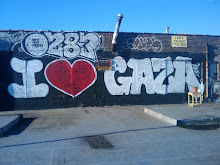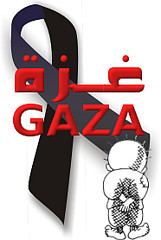It is a documentary about Arna, a Jewish woman born in the late 1920s, early 1930s in Galilee who joins the Jewish Brigade (a Jewish military group which drove out the Palestinians and helped establish Israel) and then marries Salim (?) a Palestinian man. The documentary is fuzzy on her life post marriage, but begins with her as an old woman in Jenin refugee camp in the West Bank, where she opens a theater for Palestinian children. Through art she helps the kids express their anger at their lives and the Israeli Occupation and find a way to resist the Occupation. The film starts around 1996 it seems. Jules, Arna's son and the film maker, returns to Jenin in 2002 after the Israeli incursion to see what has happened to his young friends. As is tragically predictable, Jules finds that three of the young boys Arna taught were martyred during the Intifada-- one killed by the Israelis during the incursion, two (I believe) joined militant groups and died during an operation.
The documentary shows the loss felt by the remaining friends at the death of the young men. It talks candidly about Palestinians' feelings on resistance and militancy. It's an incredibly good window into the complexity of life under Occupation. The experiences of Palestinians under Occupation are not monolithic, nor are the ways in which they process or cope with them. This is quite important to understand-- there is no one, single Palestinian experience, perhaps except that of Occupation...but this is responded to, dealt with, coped with, raged against, mourned in a multitude of ways. "Arna's Children" does really a fantastic job also of, without agenda, exposing the complexity of the history of Palestine. Arna was an Arab Jew who participated in the establishment of Israel, married a Palestinian, and lived her older years in Jenin working with the children of the camp. From that aspect alone, the film was phenomenal to watch. Two of the remaining boys speak of one friend, Yousef, who joined a militant group, and of the event that lead up to his joining it. A school had been bombed and Yousef found a 10 year old girl inside it, bleeding. He picked her up and ran her out, and she died in his arms. His friends say that after that something changed and hardened in him. I've read this before many times. In psychology, your body is able to buffer against stress through certain biological happenings. When your body can no longer buffer against this stress you "break down" in a sense and suffer severe stress or trauma. In literature I've read regarding suicide bombers there is generally one pinpointed event which breaks the person's ability to buffer against the stress of his/her existence, at which point they decide to carry out a violent act. I am not defending suicide bombing-- but it is of value to understand that it is not religious zeal, or insanity which can drive a person to undertake such an act. It's heartwrenching to watch the evolution, but is rooted in life events.
Of course, the film is heart breaking. It is racked with destruction-- emotional, physical, spiritual. The childhood lightness which dominates the first portion of the documentary gives way to an unbearably heavy reality of adulthood in Jenin. All I could think during the film was, what's the point? Helping children enjoy their childhood, fostering dreams within them of becoming the first "Palestinian Romeo" (like one kid says he wants to be) and then they grow up and into a reality which is worse and worse every single day. People respond differently to levels of psychological pressure and distress. Some reach their "breaking point" and are no longer able to, literally, bear the pressure of their life. Others manage to find and retain strength and go on to struggle and live.
There is one incredibly poignant moment in the film when Jules returns to Jenin, and he's speaking with a group of women and tells them he's heard the three boys were martyred. The women respond yes, with blessings for the boys and are so happy to see Jules again after he'd been gone 5 years, they are laughing and hugging him. Jules is so overcome with grief he looks at them and says, "But after all of this...how can you still laugh?" And the women respond, "This is our life!"
Destruction. Death.
That is their life. Interspersed with happiness and beauty, yes. But also with a disproportionate amount of loss.
It reminded me of a friend of mine in college who, also during the Intifada, turned to me and said, "I don't understand how Palestinians can still smile." These issues of resilience, continuity, struggle, they're fascinating and so so so so complex. Often for the sake of brevity and simplicity, we whittle them down to a few examples to represent a myriad of experiences. "Arna's Children" is a wonderful insight into the array of complexities that make up the Palestinian experience. If you have a chance, see it.



No comments:
Post a Comment